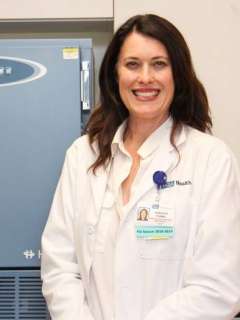Breastfeeding is natural, so breastfeeding should happen easily.
That’s the biggest misconception UCLA Health lactation consultant Genevieve Thomas, IBCLC, hears from expectant parents.
“Breastfeeding does often come easy for the baby, but it’s a learned skill for our birthing parents and the people who are supporting them,” Thomas said. “It’s really important for parents to learn about breastfeeding before they deliver their baby. It really helps them to be prepared for some of the challenges that can come in the first week of their baby’s life.”
To that end, UCLA Health offers a full spectrum of support for pregnant and postpartum parents to meet their breastfeeding goals. Available resources include classes, appointments with lactation consultants before and after giving birth, and hands-on help in the hospital after delivery.
Thomas said she encourages families to seek help early and often, noting that most new parents are exhausted after the birthing process.
“The first three days are probably the trickiest days,” she said. “Those are the days we really want to encourage families to get off to the best possible start.”
Overcoming challenges
“Babies who are placed skin to skin on their parent’s chest and allowed to breastfeed in the first hour are more likely to be breastfeeding at six weeks,” Thomas said. “Babies learn really quickly. They’re primed to learn.”
Thomas said the most common struggles in the early days can be pain while breastfeeding and ensuring that the baby is receiving enough milk.
“Many babies are able to latch comfortably but many mothers are going to experience transitional soreness,” Thomas said. “Just like the process of being pregnant is a transition for our bodies, we should expect that there is some transition with breastfeeding, but we don’t want pain that is excessive.”

She said lactation consultants can help address what’s causing pain and noted that nipples heal quickly.
“A lactation consultant is a skilled professional who can help get a better, deeper latch and provide intervention when things don’t go well,” she said.
The Affordable Care Act covers lactation support and supplies, such as breast pumps. Following discharge, parents can be set up with appointments to see a lactation consultant at the UCLA Health Outpatient Lactation clinic.
“We provide support in a variety of ways,” Thomas said. “Sometimes we can do that with a phone call, a video visit, or in-person. We also offer support groups. And we respond to a lot of MyChart messages.”
As for whether the baby is consuming enough milk, she said pediatrician visits after discharge will monitor weight gain and help identify the need for lactation support.
Preparation during pregnancy
Thomas said lactation consultants joke that teaching breastfeeding during pregnancy is like teaching swimming without going in a pool.
Even though parents will ultimately learn by doing, the breastfeeding classes offered by UCLA are invaluable for setting expectations, answering questions and helping new parents prepare.
“We show lots of videos of what good breastfeeding looks like and what a good latch looks like,” she said. “The classes give parents the knowledge of what to look and listen for.”
In addition to taking classes, Thomas said some parents-to-be may want to schedule a 30-minute appointment with a lactation consultant to discuss their breastfeeding goals and review their health histories.
For instance, mothers who are older, underwent fertility treatment, have certain preexisting conditions or previous breast or chest wall surgeries, may benefit from extra resources.
“They might need to breastfeed with support,” Thomas said. “They might need some additional things like breast pumps.”
Lactation consultants can also help mothers manage other issues, including an oversupply of milk, which is very uncomfortable. They assist mothers of premature babies with pumping.
Support for any goal
The goal at UCLA Health Lactation is to support parents with whatever their breastfeeding goals are.
Thomas said UCLA Health is committed to providing and promoting compassionate, inclusive and equitable care especially for lesbian, gay, trans and gender-diverse patients.
"Overwhelmingly, all of the evidence points to the fact that breast milk is the best way to feed a baby and the most efficient way to do it is directly at the breast."
GENEVIEVE THOMAS, LACTATION CONSULTANT
“We encourage parents to share their preferred pronouns and terms for infant feeding,” Thomas said.
Families with a variety of breastfeeding objectives are also supported, whether that’s parents who supplement with formula, those with short-term goals, or those who exclusively pump milk rather than directly breastfeed.
“We recommend that babies be breastfed for a year or longer but our goal is their goal,” Thomas said. “Partners need to come to the table with that same attitude: ‘I’m here for her to help in whatever way I need to help.’”
Thomas said breastfeeding for the first time is really hard. She said negative breastfeeding experiences can trigger postpartum depression and anxiety.
For mothers who struggled with breastfeeding their first child, they can seek more help with subsequent pregnancies, including discussing what went wrong.
“It can be really traumatic when you have a bad breastfeeding experience,” she said. “It’s really soul crushing for some of the parents that have struggles. It’s a completion of the reproductive process and it feels really big and important for them.”
Although breastfeeding can bring challenges, Thomas said the health benefits are so powerful for baby and mother, including the way producing milk burns fat stored during pregnancy and lowers the risk of heart disease.
“Overwhelmingly, all of the evidence points to the fact that breast milk is the best way to feed a baby and the most efficient way to do it is directly at the breast,” Thomas said. “We know it comes with concerns and complications. The health benefits are so important and that’s why we promote breastfeeding.”
Learn more about services provided through UCLA Obstetrics and Gynecology.
Courtney Perkes is the author of this article.



